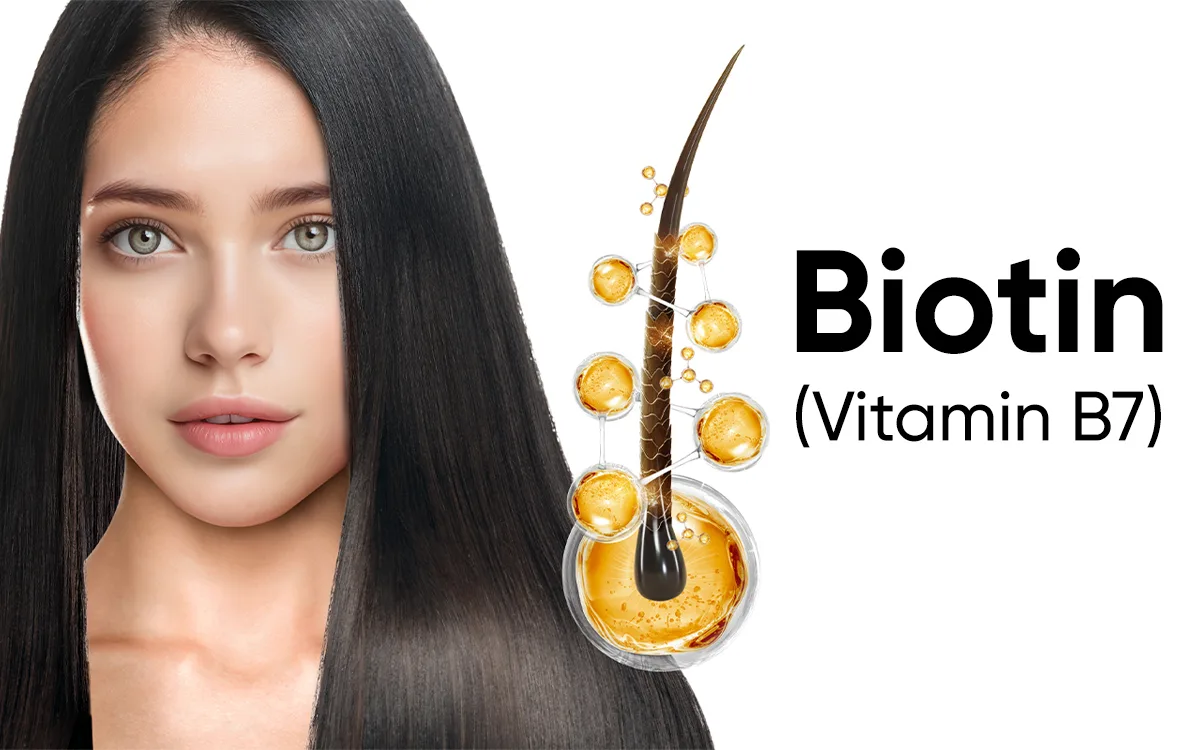Ever since biotin came into the beauty and wellness scene, this word is often mentioned alongside hair and nails. Whether in dietary supplements, arranged formulas, shampoos, or skin creams, this B-vitamin is largely thought to maintain the integrity of skin and nails. But what does biotin do, and how can you add it to your daily routine? This guide will reveal everything you should know about biotin from food sources to ideal intake levels to supporting hair, skin, and nails.
What is Biotin?
Biotin, also known as vitamin B7, belongs to the family of complex vitamins. It plays an essential role in converting food into energy. Since the body does not store biotin for long periods, regular intake from dietary sources or supplements is necessary to maintain healthy biotin levels.
Biotin and Hair, Skin, and Nails
Biotin is commonly associated with maintaining hair, skin, and nail health. Many people turn to biotin supplements when dealing with brittle nails or hair loss. While biotin is often included in beauty products, its effectiveness is primarily based on individual biotin levels. Those with a deficiency may notice visible changes when increasing their intake through diet or dietary supplements.
Food Sources of Biotin
A balanced diet can provide sufficient biotin. Here are some excellent sources of food:
- Eggs (but avoid raw egg whites as they contain avidin, a protein that interferes with biotin absorption)
- Almonds, walnuts, sunflower seeds, and other nuts and seeds.
- Whole grains
- Bananas
- Sweet potatoes
- Liver and other organ meats
- Dairy products, such as milk and cheese
These natural sources help maintain steady biotin levels without the need for high doses of biotin supplements.
Biotin and Metabolism
Biotin is a vital nutrient that forms an important part of the metabolic functions in the body organ. It assists in the breaking down of carbohydrates, fats, and proteins by enzymes, so the body can take full advantage of efficiently converting food into energy. This process helps with overall health, delivering energy for the performance of daily activities and body functions.
Biotin and Skin Health
Biotin is often associated with maintaining healthy skin. It supports the formation of fatty acids that help keep the skin hydrated and balanced. Those with low biotin levels may experience dryness, irritation, or dull-looking skin. Ensuring a sufficient intake of biotin through diet or supplements may contribute to a naturally radiant complexion.
Biotin and Digestive Health
Biotin plays a role in breaking down carbohydrates, fats, and proteins, making it essential for a well-functioning digestive system. It supports gut bacteria, helping with nutrient absorption and overall digestive balance.
Biotin and Aging
As people age, their body’s ability to absorb nutrients may change. Biotin contributes to maintaining skin elasticity, hair strength, and nail health, making it a valuable nutrient for aging gracefully.
Biotin and Sleep Quality
Since biotin is involved in metabolism and neurotransmitter production, it may play a role in energy regulation and sleep patterns. Maintaining balanced biotin levels could contribute to better rest and relaxation.
The Connection Between Biotin and Stress
Stress can deplete essential nutrients in the body, including B vitamins like biotin. Ensuring adequate intake may help support the body’s response to stress and maintain overall well-being.
Biotin and Nervous System Support
Biotin plays a key role in maintaining a well-functioning nervous system. It contributes to the health of nerve cells and helps in the production of neurotransmitters. These neurotransmitters are essential for proper brain function, muscle movement, and overall neurological health. Ensuring adequate biotin intake may support cognitive performance and energy levels, making it an important nutrient for overall well-being. Biotin is particularly important for pregnant women, as it contributes to fetal development. Since pregnancy can lead to an increased demand for biotin, maintaining adequate intake is essential. Many prenatal supplements include biotin along with other essential nutrients to support the health of both the mother and the baby.
Natural vs. Supplemental Biotin: Which One is Better?
Biotin is available in both food sources and dietary supplements. Understanding the benefits of each can help individuals choose the best way to maintain optimal biotin levels.
High Doses of Biotin: What You Should Know
Some people take high doses of biotin in hopes of improving hair and nail health. While biotin is water-soluble and excess amounts are generally excreted, extremely high doses may interfere with some lab tests. Before taking high doses of biotin, it is always best to consult a healthcare professional.
Biotin in Dietary Supplements
Many dietary supplements contain biotin, either as a standalone ingredient or combined with other nutrients in complex vitamins. Those choosing supplements should check for quality and consult a healthcare provider to determine the appropriate dosage.
Conclusion
Biotin plays a vital role in maintaining healthy skin, hair, and nails. While most people can obtain enough biotin through food sources, some may turn to dietary supplements for additional support. Understanding the right intake levels and being mindful of high doses of biotin can help ensure a balanced approach. Whether from food or supplements, biotin can be a valuable part of a well-rounded diet and self-care routine.

